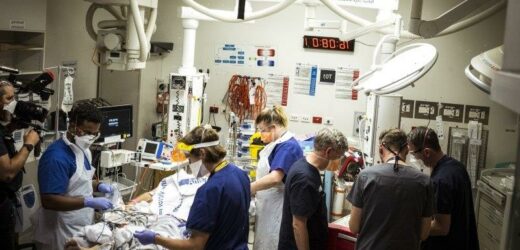Frontline health workers in Victoria will receive $3000 in bonuses as hospitals and emergency services try to retain exhausted and overworked staff and prepare for a difficult winter.
The Australian Medical Association had called for bonus payments, fearing a mass exodus of staff who are already leaving or scaling back their hours at a concerning rate after two gruelling years and an unrelenting wave of sick patients.
A man brought into the ED under cardiac arrest is worked on by the emergency team in the busy emergency department of the Royal Melbourne Hospital.Credit:Chris Hopkins
On Thursday morning, Premier Daniel Andrews announced that all staff working in public hospitals and ambulance services, including nurses, midwives, allied health professionals, paramedics, cleaners and ward clerks, would receive $3000.
The first retention and surge $1500 payment will be made on August 15, the second at the end of September as part of the $353 million retention package.
Other “practical help” such as free meals, will also be provided.
“This payment, I think, is very well deserved, and will have a real impact in bringing staff back,” Andrews said.
“This is all about encouraging people to take up shifts, if they can to go from being part-time to maybe working some further hours … It’s also about bringing people back into the system who might have been out of the system for a period of time.
“It’s also a fundamental acknowledgment of the extreme pressure … the really significant challenge that there is in our health system at the moment, and trying to, not only express our gratitude but to, incentivise and see more and more staff stay on our public hospital system.
Last month, a senior doctor at Melbourne’s major trauma centre, Professor John Wilson, resigned, citing untenable and deteriorating conditions in Victoria’s healthcare system. He warned the situation was putting lives at risk and pushing healthcare workers to breaking point.
The Age has previously reported that conditions in the state’s hospitals have recently deteriorated to the point that, for the first time, patients with critical illness or injuries are being forced to wait for care.
More to come
Most Viewed in National
From our partners
Source: Read Full Article



